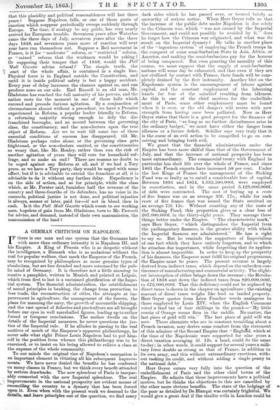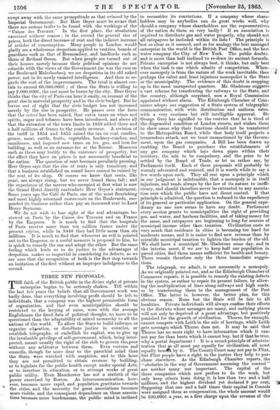A GERMAN CRITICISM ON NAPOLEON.
Jthere is one man and one system that the Germans hate with more than ordinary intensity it is Napoleon III. and his Empire. A King of Prussia who is as despotic without the intelligence, a Bismark who is as audacious without the zeal for popular welfare, that mark the Emperor of the French, may be recognized by philosophers as more genuine types of absolutism, but are less dreaded and more esteemed by the pub- lic mind of Germany. It is therefore not a little amusing to receive a pamphlet, written in Munich and printed at Leipsic, which from first to last is a sustained glorification of the Impe- rial system. The financial administration, the establishment of sound principles in banking, the change from protection to free trade, the reconstruction of cities, the attempts at im- provement in agriculture, the man ement of the forests, the plans for manning the navy, the growth of mercantile shipping, and the vast spread of fisheries and pisciculture are all brought before our eyes in well marshalled figures, leading up to rather forced or foregone conclusions. The author dwells on the details of the Imperial measures, he never questions the jus- tice of the Imperial rale. If he alludes in passing to the real motives of much of the Emperor's apparent philanthropy, he never asks what right Prince Louis Napoleon had to put him- self in the position from whence this philanthropy was to be exercised, or to insist on his being allowed to relieve a class at the expense of the whole community.
To our minds the original vice of Napoleon's usurpation is an important element in vitiating all his subsequent improve- ments. We have never denied the benefits he has conferred on many classes in France, but we think every benefit attended by serious drawbacks. The new splendour of Paris is insepar- ably connected with the new Imperial splendour. The real improvements in the national prosperity are evident means of reconciling the country to a dynasty that has been forced. upon it. Even when with the present work we descend to the details, and leave principles out of the question, we find many dark sides which he has passed over, or treated briefly as unworthy of serious notice. When Herr Geyer tells us that the increase of the public debt under Napoleon is due solely to the Crimean war, which " was not caused by the Imperial Government, and could not possibly be avoided by it," does he forget how the Crimean war originated, and what was its result on the Imperial dynasty He talks in another place of the " ingenious system " of employing the French troops in the conquest of some semi-barbarian State in Asia, Africa, or America, and making the semi-barbarians pay for the honour of being conquered. But even granting the morality of this course, we must suppose that the supply of semi-barbarian nations will some day be exhausted, and that even if they are not civilized by contact with France, their funds will be com- pletely drained by the first indemnity. Another blot on the Napoleonic system is the encouragement of labour against capital, and the constant employment of the labouring hands for fear of the mischief resulting from idleness. As this is one of the chief motives for the embellish- ment of Paris, some other employment must be found when it is over, or the old dangers will revive with new strength from having once been palliated. Now as Herr Geyer states that there is a good prospect for the finances of the city of Paris, "so long as no further disturbances arise in the ordinary budget," we must have either the danger from idleness or a future deficit. Schiller says very truly that it is the curse of an evil action to be compelled to go on con- ceiving and bringing forth evil.
We grant that the financial administration under the Empire has been more skilful than that of the Government of July, and that the increase of national prosperity has been most extraordinary. The commercial treaty with England in particular has shed life over the whole of France, and since 1861 the French exports have increased 58 per cent. Under the last Kings of France the management of the Sinking Fund was so faulty as to entail a considerable loss of capital. Between 1816 and 1854, 1,633,500,000f. were employed in amortisation, and in the same period 3,429,000,000f. of debt were contracted. The cost of buying up a rente of five francs was on an average 93f. 77c., while for each rente of five francs that was issued the State received on an average 75f. 15c. Without counting any of the costs of the Sinking Fund, this proportion gives us a clear loss of 307,000,000f. in the thirty-eight years. They manage these things better under the Empire. " The characteristic mark," says Herr Geyer, " which distinguishes the Imperial from the parliamentary finances, is the greater ability with which the Imperial finances are administered." He has a right to say so. But he reminds the supporters of Imperialism of one fact which they have entirely forgotten, and to which he attaches due importance, while forgetting that its applica- tion is almost impossible. In order to keep up the prosperity of his finances, the Emperor must fulfil his original programme, the Empire must be peace. The present revenue is largely derived from indirect taxes, which depend on the unbroken con- tinuance of manufacturing and commercial activity. The slight- est interruption of either brings down the revenue ; the Revolu- tion of 1848 sent down the indirect taxes from 820,000,000f. to 676,000,000f. That this deficiency could not be replaced by direct taxes is shown in the chapter on agriculture ; the existing amount of direct taxes weighs like lead on landed property. Herr Geyer quotes from L6on Faucher words analagous to those employed by Louis XIV. when the English Commons voted a land tax of four shillings in the pound—" My little cousin of Orange seems firm in the saddle. No matter, the last piece of gold will win." The last piece of gold will win now. Those alarmists who are in constant trembling about a French invasion, may derive some comfort from the statement of this admirer of the Second Empire that " Englatd, which at the time of the Napoleonic wars supported for nine years a direct, taxation averaging 5/. 12s. a head, could do the same to-day; in other words, it could support for several years a mili- tary force double as strong as that of France, in addition to its own army, and this without extraordinary exertions, with- out tasking its credit, and without adding a single penny to the national debt."
Herr Geyer enters very fully into the question of the embellishment of Paris and the other chief towns of the Empire. He admits that these improvements have a political motive, but he thinks the objections to this are cancelled by the other more obvious benefits. The state of the lodgings of the poor as detailed by De Blanqui was certainly frightfuL We would give a great deal if the similar evils in London could be swept away with the same promptitude as that evinced by the Imperial Government. But Herr Geyer must be aware that there are serious faults to be found with the workings of the " Caisse des Travaux." In the first place, the absolutism exercised without reason ; in the second the general rise of prices, both the direct increase of rent and the indirect increase of articles of consumption Many people in London would gladly see a wholesome despotism applied to vestries, boards of guardians such as that of Bermondsey, and landlords such as those of Bethnal Green. But when people are turned out of their houses merely because their political opinions do not coincide with the views of the Government (as was the case on the Boulevard Malesherbes), we see despotism in its old naked power, not in its newly vaunted intelligence. And then as re- gards the cost of the improvements. The total is almost cer- tain to exceed 60,000,000/. ; of these the State is willing to pay 2,000,0001., the rest must be borne by the city. Herr Geyer thinks that the city of Paris can bear it easily, on account of the great rise in material prosperity and in the civic budget. But he leaves out of sight that the civic budget has not increased merely by the rise in prosperity. He passes over the facts that the octroi has been raised, that extra taxes on wines and spirits, sugar and tobacco have been introduced, and above all that the extension of the town limits in 1859 added three and a half millions of francs to the yearly revenue. A revision of the tariff in 1854 and 1855 raised the tax on coal, candles, grease, meat, cattle, fruits, vegetables, hackney-coaches, and omnibuses, and imposed new taxes on ice, gas, and iron for building, as well as an entrance-fee at the Bourse. Measures such as these may testify to the existence of prosperity, but the effect they have on prices is not necessarily beneficial to the nation. The question of rent becomes peculiarly pressing. Herr Geyer says that the rise of rents is only transitory, and that a business established on sound bases cannot be ruined by the rent of its shop. Of course we know that rents, like yeast, are always rising, but we never found them fall ; and the experience of the mercer who occupied at first what is now the Grand Hotel directly contradicts Herr Geyer's statement. Some years ago the Café de Paris, one of the most flourishing and most highly esteemed restaurants on the Boulevards, sus- pended its business rather than pay an increased rent to Lord Henry Seymour.
We do not wish to lose sight of the real advantages be- stowed on Paris by the Caisse des Travaux and on France by the Emperor. It is much to find that the hospitals of Paris receive more than ten million francs under the present regime, while in 1848 they had little more than six millions. It is much to find that whenever an evil is pointed out to the Emperor, or a useful measure is proposed to him, he is quick to remedy the one and adopt the other. But the same feeling which leads us to do justice to the advantages of despotism makes us impartial in considering its defects, as we are sure that the recognition of both is the first step towards an imitation of the first without an improper indulgence to the second.































 Previous page
Previous page